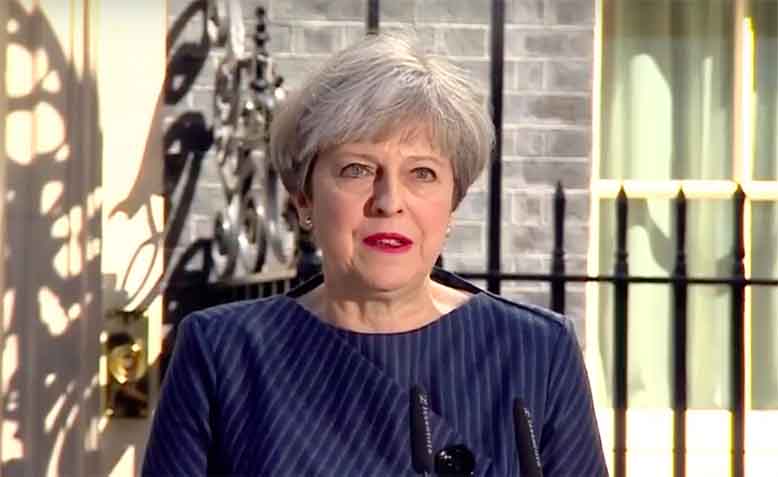 Prime Minister Theresa May. Photo: Wikipedia
Prime Minister Theresa May. Photo: Wikipedia
We need to make Theresa May’s election gamble her last, argues John Rees
Theresa May’s gamble on a general election is a product of weakness, not strength. How do we know? Because that’s exactly what she said outside 10 Downing Street this morning.
May said the SNP are against us, the Lib-Dems are against us, Labour is against us, the House of Lords is against us, and so we can’t hope to get our policies through, particularly on Brexit, with a mere 12 seat majority. That is why another general election is necessary.
So, gone is the ‘no election until 2020’ rhetoric, and gone too is the fixed term parliament agreed only a few years ago.
But if May and the Tories think that a narrow referendum win for Brexit last year will translate into an increased majority at the general election on 8th June they are wrong. Why?
Firstly, the vote will not be over Brexit, it will be over the whole government record, including the NHS, declining living standards, the housing crisis, support for Trump and his wars. These are issues on which the government is deeply unpopular.
Secondly, to the extent it is about the European Union, the question is no longer do you want to leave the EU? The question is now, do you want a Tory Brexit? Huge numbers of people, irrespective of whether they voted Leave or Remain in the referendum, will answer with that with an emphatic ‘No’. There is simply nothing like a majority for a Tory Brexit.
This may mean the Lib-Dems have a revival in some areas taking as many seats from the Tories as the Tories might hope to gain from the collapse of UKIP’s share of the vote. It is very unlikely there will be any Tory revival in Scotland. There is no likely outcome of a general election in Scotland that will not deepen May’s constitutional crisis over independence
Thirdly, Labour will close the gap on the Tories, and the boundary changes have not come into effect so the Tories can’t reply on the 20 seat boost they would have got as a result.
It’s true the constant internal warfare generated by the ‘Corbyn must go’ right wingers (and their echo chamber on the left) have done enormous damage. And it’s true they may continue with this even in an election campaign. But the likelihood is they will be at least quieter during a campaign, if only to avoid getting the blame for any defeat.
More importantly, while some of the left have been consumed by misery at the Brexit vote and the Trump victory the truth is that any objective assessment of politics shows a process of polarisation, not the linear rise of the populist right. Yes, Trump won, but the Sanders campaign revived socialist politics in the US on a scale not seen since the 1930s. The populist right was supposed to sweep the board in Austria and Holland. But they were rebuffed. Only weeks ago, Marine Le Pen was destined to be stopped only by a Blairite candidate. Now the far-left candidacy of Jean-Luc Mélenchon has upset all predictions and, even if he doesn’t make the second round, he has rebuilt the French left.
Jeremy Corbyn should be aiming to make good the poll deficit by similar methods because Melenchon was at least as far behind in the polls when the French Presidential campaign began as Corbyn is now.
So, audacity is the order of the day. Corbyn should take a leaf from Mélenchon’s book and denounce the banks and corporations, NATO and the EU, for the capitalist con trick they are. He should unashamedly run as the establishment’s unbending opponent and as the outspoken champion of working people, the unions, and the social movements.
Then, if he fails, at least it will not be by his own hand and at the cost of demoralising the left and working people, their organisations and their hopes.
Better for the whole left to fight now than wait out the months and years of internal back-biting and attempted coups which would inevitably drag on all the way to 2020.
There may or may not be a majority Labour government, but that is not the only bad outcome for the Tories. There may be a minority Labour government supported by the SNP. There may be a Tory government with a reduced majority, and that would be a huge disaster for the whole UK ruling class and a huge opportunity for the left.
The fight is on and there is everything to play for.

